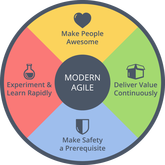
Some of the restarts I've witnessed have included an intro game, a working agreement, a definition of done, and a definition of ready. Adkins' book focuses mostly on a restart as a chance to team better...to get to know your fellow teammates, and define what you value as a team. What does the team want to be known for?
In the last couple of years, I've been using Modern Agile to coach the organization, the management, and the teams. It's worked so well, that it wasn't even a choice to us Modern Agile to do a team reset...the only question was "How?." (Learn more about Modern Agile at http://www.modernagile.com/)
I came up with a few ideas, perhaps you'll come up with more. Let me know, and I will add them in - with credit to you, of course.
Make Safety a Prerequisite: Personal Journey Map - I draw my own journey line, and use it as an example. I include ups as well as downs, career-related events as well as personal events (children, buying a house, etc.). I give them 5-7 minutes to complete the map, and then we go around the room and listen to everyone talk about their own personal journey. Questions are definitely allowed. This helps the team to become closer, and learn about similarities as well as differences. The most recent time I played this, everyone on the team had started out in a different career than they ended up in. Other teams found that they had all moved around a lot as children, or all liked chess.
Deliver Value Continuously: Scrum in 10 Minutes - I walked through the Scrum cycle, asking team members how they had done it in the past - what worked, what didn't. By the end of the cycle, we had a good idea where to start. At the first retro, we discussed what was decided and how that was working out, and made a few tweaks.
Make People Awesome: Is/Is Not - This is a good way to delve into specific practices, like code reviews, mobbing, and production support. The idea is to have the team write post-its for those things that they are - positive or negative (a team with 100% code coverage, a team that is flexible, a team that starts stand-up late) and things they are not (a team that doesn't argue, doesn't shoot Nerf guns, doesn't miss an Innovation Day). The discussion forms around how they actually want to be, or not!
Experiment and Learn Rapidly: Apollo 13 - This is, in my opinion, one of the most Agile movie scenes ever. They have to do an impossible thing, with only the tools they have. They experiment a lot, and come up with something that no one person could have figured out on their own, and work with their business partners (astronauts) to get value out of it. Grab a bag of stuff - any stuff. Take some index cards and write various problems on them (stranded on a desert island, have to get across town in a very short period of time, need to organize a party in 30 minutes, etc.) and only use the things in the bag. You can also use index cards for the "stuff" - maybe they only have $12 cash, three pickle jars, a mouse pad, and a fishing pole...or something. Use your imagination, and they will use theirs.

 RSS Feed
RSS Feed